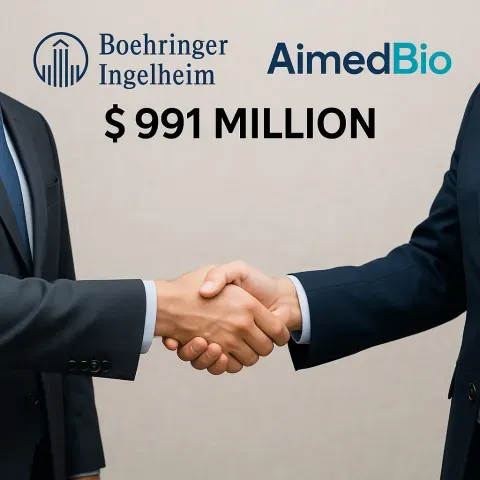
SHERIDAN, WYOMING – October 15, 2025 – Boehringer Ingelheim is continuing its high-stakes investment strategy in next-generation oncology treatments, signing a deal worth up to $991 million with South Korea’s AimedBio to license an antibody-drug conjugate (ADC) for cancer. The move underscores Boehringer’s accelerating focus on precision oncology and reinforces its growing footprint in the ADC space—one of the most competitive frontiers in cancer therapeutics.
Strengthening Boehringer’s Cancer Therapeutics Pipeline
The agreement between Boehringer Ingelheim and AimedBio includes an undisclosed upfront payment, alongside development, regulatory, and commercial milestone payments totaling nearly $1 billion. AimedBio will also receive royalties on future net sales. While the specific ADC asset and its targeted indication remain undisclosed, AimedBio’s pipeline features multiple oncology candidates, including a preclinical ADC for solid tumors.
In a statement, Vittoria Zinzalla, Global Head of Experimental Medicine at Boehringer Ingelheim, said the collaboration will help expand the company’s portfolio of precision medicines “for currently hard to treat cancers.”
Building on a Year of Strategic Oncology Partnerships
The AimedBio agreement marks Boehringer’s fifth major partnership in 2025, following a series of multi-billion-dollar collaborations aimed at advancing biologics, immunotherapies, and targeted oncology platforms. Earlier this year, Boehringer signed two deals in January:
- A $1.3 billion agreement with Lonza’s ADC subsidiary Synaffix, granting access to its proprietary payload-linker technology for the creation of best-in-class ADC molecules.
- A collaboration with Oxford BioTherapeutics, where Boehringer exercised its option to advance a fourth novel cancer target, assuming full development and commercialization responsibilities.
Diversification Across Immunology and Ophthalmology
Beyond oncology, Boehringer Ingelheim has broadened its strategic reach across adjacent therapeutic areas. In April, the company entered a $375 million licensing agreement with Cue Biopharma to develop CUE-501, a bispecific molecule that targets both B cells and cytotoxic T cells to treat autoimmune and inflammatory diseases.
Then in July, Boehringer deepened its commitment to ophthalmology through a $1 billion-plus collaboration with Re-Vana Therapeutics, focusing on long-acting delivery platforms for eye diseases. These initiatives reflect Boehringer’s clear push toward modality diversification—spanning biologics, RNA therapeutics, and advanced delivery systems.
Rising Momentum in the ADC Market
Antibody-drug conjugates have rapidly emerged as one of the hottest sectors in oncology, offering targeted cytotoxic delivery to tumor cells while minimizing systemic toxicity. Analysts project the global ADC market to surpass $25 billion by 2030, driven by expanding indications, novel linker technologies, and regulatory approvals across solid and hematologic cancers.
Boehringer’s entry into the ADC space through multiple partnerships positions it competitively alongside major players such as AstraZeneca, Pfizer, and Daiichi Sankyo—all of whom are racing to establish dominance in next-generation antibody-drug conjugate pipelines.
Strategic Outlook and Industry Implications
By pairing AimedBio’s novel ADC technology with Boehringer’s global development infrastructure, the deal strengthens the German pharma’s oncology ecosystem and its long-term ambitions in targeted cancer therapy. The company’s multi-pronged investment strategy—spanning discovery, development, and delivery platforms—signals an aggressive bid to build a sustained leadership position across immuno-oncology and precision medicine.
As ADC innovation continues to reshape oncology R&D, Boehringer’s latest partnership exemplifies how major pharmas are using strategic licensing to access cutting-edge assets from emerging biotech firms.
Learn more at www.boehringer-ingelheim.com.